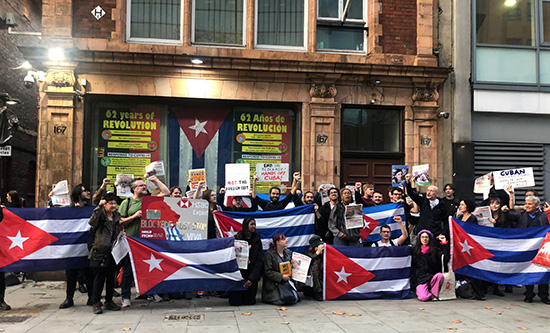
Cuba is fighting to recover from the devastation of Hurricane Ian, which struck the west of the island on 23 September. But growing international solidarity with Cuba faces frustration and repression from the US ruling class and its collaborators.
High-level talks between Cuba and the US resumed in September after a four-year hiatus which began during the presidency of Donald Trump. The focus is on restarting the US-Cuba visa programme and re-opening consular services in Cuba. A record 220,000 Cubans were intercepted at the US-Mexico border in the year up to 30 September 2022, and 6,000 more attempted to reach Florida in small boats – a mass migration resulting from the economic effects of the Covid-19 pandemic as well as the tightened sanctions regime imposed by Trump and maintained under Biden. The US has announced that by 3 January 2023, it will resume processing 20,000 visas a year for Cubans wanting to move to the United States. At the same time, the Biden administration has recently introduced regulations to penalise Europeans who travel to Cuba by excluding them from the Electronic System for Travel Authorisation (ESTA), its visa waiver system applied in 40 countries. Those affected must now apply for a visa and be interviewed at a US embassy if they want to enter the United States, a costly process which can take months to return a decision. The pretext of this new ruling is the designation of Cuba as a ‘state sponsor of terrorism’ by the Trump administration in January 2021, a designation renewed under Biden. This measure is designed to hurt the revenues of the Cuban state by discouraging visitors of all kinds from going to Cuba. So far, none of the 40 countries participating in the ESTA programme has publicly objected to the policy.
The international solidarity movement with Cuba has also faced attacks from the US government. On 17 September, Puerto Rican solidarity activists protested against the FBI for its repeated harassment of members of a 90-strong solidarity brigade which visited Cuba in July with the Cuba Solidarity Committee of Puerto Rico. FBI agents called or showed up at the homes of around half the brigadistas. As noted by Milagros Rivera, President of the Committee, ‘The Cuban Revolution is a hope for the entire world, especially for Puerto Rico where the situation is very bad… The FBI is an instrument to perpetuate colonialism in our country’. FBI attempted intimidation is a sign that the US government fears the effectiveness of brigades by which Puerto Ricans learn from Cuba’s example of standing up to US imperialism.
The arch-reactionary Florida senator Marco Rubio has also attempted to enlist the FBI in intimidating Cubans in the US who attempt to oppose the blockade. In August, Rubio accused the Puentes de Amor (Bridges of Love) project of spreading communist propaganda on behalf of the Cuban state and called for the FBI to investigate and criminalise the group. On 11 October, Bridges of Love filed a complaint against Rubio with the US Congress Ethics Committee for legal violations, prompted by Rubio’s unhinged campaign of slander and intimidation against the group’s co-founder, Carlos Lazo. The non-profit organisation was established in 2020 and calls for normalisation of US-Cuba relations. Bridges of Love has organised caravanas in Florida and other states to mobilise Cubans against the US blockade of Cuba. In August Cuba received a donation of 500kg of powdered milk and medical supplies purchased with $50,000 raised by Bridges of Love, donated by US citizens including many Cuban emigrants, to alleviate the harmful effects of the blockade. The group presents a political threat to the right-wing Miami Cuban exile lobby which has historically dominated politics in the electorally significant Cuban community in Florida.
Meanwhile, banks across the world continue to illegally block or delay donations intended to help Cuba rebuild. The #1c4Cuba campaign (www.1c4cuba.eu) co-founded by Rock around the Blockade (RATB), the RCG’s campaign in solidarity with socialist Cuba, has exposed the collaboration of British banks in enforcing US sanctions against Cuba by blocking transactions. Such activity is in violation of the Extraterritorial US Legislation (Protection of Trading Interests) Order 1996 amongst other UK laws and EU law. Lloyds Bank contacted the holder of the British bank account of the #1c4Cuba campaign on 14 October to announce it would close the account without giving notice or explanation; the campaign has already exposed instances of Lloyds blocking international transactions that mention the word ‘Cuba’. RATB organised pickets across Britain on 26 November at Lloyds branches to protest against the account closure. Another British bank, NatWest, rejected a payment to Cuba’s Hurricane Ian relief fund, and gave the customer a bogus excuse for this callous policy: ‘Cuba is still on our sanctioned list, and we have to abide with the international laws.’ Such laws are a fiction. Cuba is not subject to any British, European or international sanctions, only unilateral US sanctions. British and European banks are hiding behind non-existent ‘international’ rules to conceal their subservience to US imperialist interests.
It is not enough to react passively to these attacks on Cuba solidarity. We must go on the offensive and pressure our governments to apply laws against banks that enforce US sanctions.
Will Jones
FIGHT RACISM! FIGHT IMPERIALISM! 291 December 2022/January 2023




